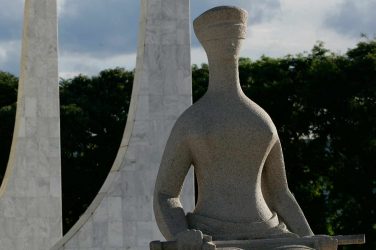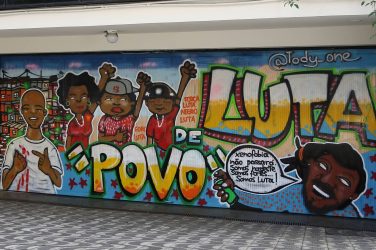Within the past week and a half since Brazilians elected Luis Inácio “Lula” da Silva to an unprecedented and historic third term in office, no less than three coup attempts have been thwarted. As a mass phenomenon, extreme public violence stems from economic inequality and perceived pressure on privileges that were precarious to begin with. Although the country’s hardened crust takes for granted the 49,000 plus yearly deaths from firearms and the genocide law enforcement commits against Afro-descendant youth, nothing can normalize such atrocities. Nor should silence cover over these coups as inequality is what they seek to perpetuate.
On Election Day itself, emergency reports reached the Supreme Electoral Court (TSE) in Brasília regarding an operation by the Federal Highway Police (PRF) in the northeastern states, traditionally loyal to Lula and the Workers’ Party (PT). Roadblocks were set up with the apparent aim of keeping citizens from accessing polling booths. The head of the Police was summoned to the Court, ordered to call off the operation, and threatened with jail if he did not. Amid the police prompted coercion, anywhere up to three million votes favorable to Lula could have been lost. That Chief Justice Alexandre de Moraes did not extend voting hours to compensate for the putsch may have been part of a Machiavellian gambit. His achievement is to have come out of the fray empowered with the respect of which he had been deprived during the four years of Bolsonaro’s anti-government.
The third coup attempt has just come to a close. As was broadly report, the defeated president refused to recognize Lula’s victory. Within hours of the results, bolsonarist hordes stormed public spaces, mainly in the southeastern and southern states. They were accompanied by squadrons of truckers who blocked up to 200 major highways, including access to Guarulhos International Airport in São Paulo, the country’s largest. Hundreds of passengers were stranded, with dozens of flights cancelled. Some bolsonarist fanatics rushed PT vehicles, while others stampeded PT gatherings. A hardier pack in the southern state of Santa Catarina raised their arms in a Nazi salute in front of a military base. Still others reveled ecstatically at the fake news reporting how Chief Justice Moraes had been arrested. A host of white supremacist M.D.’s and lawyers still yearns for violent change, but they seem to have lost institutional support. The generals are silent.
A spectrum of coups
Even before the October 30 run off, another flank of the coup was in the making. For over six months, polling firms had shown how Lula would most likely achieve victory in the first round of elections against incumbent Jair Bolsonaro. Results from the elections proved otherwise. The shrunken margin between the leaders sent the opposition into panic, while emboldening the incumbent.
Polling is an imperfect science even its practitioners concede. Yet once the lower house of Congress began making moves to criminalize the firms, no longer was the tally the only process out of sync. President of the Chamber of Deputies, Arthur Lira, tabled the bill to criminalize at least six polling firms allegedly because the results had misled the population. Seen from the perspective of his unwavering loyalty to Bolsonaro, his argument made no sense. By a long shot, Bolsonaro was the candidate who most benefitted from the surprise results. In hindsight, what plausibly shifted the results from those predicted by the polls can be accounted to maneuvers already at work in the preliminary stages of the election to bar citizens favorable to Lula from voting. Indeed, at least 25 percent of eligible voters in the first round either did not cast their ballots, or annulled their choice by voting blank.
Months ago, a host of national and international news outlets reported how a group of Brazilian officials with direct ties to the Palácio do Planalto purchased Israeli surveillance software through different political connections. Some of these intermediaries include the inner circle of Dubai Prince Hamdan bin Mohammed bin Rashid Al Maktoum, as well as the office of the Israeli Prime Minister. Whether or not this surveillance software works as well as the one whistler blowers involved in Brexit and the election of Donald Trump contend regarding Cambridge Analytica’s, the fact of the matter is that Bolsonaro’s sons vigorously campaigned to purchase it. They did so with direct agreement of the four-star generals who have actually run the state apparatus and audit the voting system since the impeachment of Dilma Rousseff.
By mid-week, Lula’s transition team has been quick to move. As PT militants grew concerned with the possibility of Arthur Lira vying for another term as Speaker of the Chamber of Deputies, Lula’s team declared its intention to table a Constitutional Amendment ensuring a permanent welfare program. For almost half of the country’s population currently living through food precariousness, this program would boost new unemployment benefits and the minimum wage above inflation rates. Lula also aims to reboot his famed Bolsa Família funds-for-studying program, thus replacing Bolsonaro’s meager and chaotic money transfer measures. The cynical power play underscoring the leanings of Centrist deputies is what drives professional politics in Brasília to somewhere beyond ideology. Bolsonaro’s “secret budget” was aimed at legalizing all forms of kickbacks in exchange for votes. Nonetheless, by providing support to Lula’s pledge to the poor, Lira’s own thirst to maintain his privileges as House Speaker might just be salvaged.
By week’s end, Lula also declared his intention to spark a major tax reform. As a first step, it also aims to temper Brazilians now furious at having been relegated to living in misery under Bolsonaro, as well as uplift those who have grown poor due to his use of state funds to ensure re-election. This reform would exempt those earning up to BRL 5000 from paying income tax. Brazil’s tax burden is heavier even when compared to OECD countries due mainly to its taxation of consumption, junk food and drinks, oil derivatives and gasoline. A case in point: while small enterprises rightly find their tax on labor to be high in relation to earnings, large companies and owners of capital pay next to nothing in tributes.
Typically, the Folha de S. Paulo, now generally discredited due to its pro-Bolsonaro leanings but still a powerful newspaper among dominant sectors, was quick to publish a hypocritical op-ed to counter Lula’s move. Despite the admission of Harvard-educated columnist Vinicius Torres Freire to not having exact data at hand, in the name of “tax justice” he contests any need for income tax brackets to be readjusted, let alone to allow for exemptions. Currently, the country’s highest tax rate is 27.5%, affecting earnings above BRL 4600 per month. Relevant to at most 20 percent of the population, the salaries of whom range anywhere up to BRL 100K per month, what the reform tries to reach is the traditionally exempted 0.5%. That said, next to nobody in the top zero-point-one earns their income through wages or salaries. Inheritance tax is less than eight percent, while dividends run tax-free. When you add on to that the possibility of deducting expenses from privatized education, health and retirement investments, even the top 5 percent, essentially the totality of anyone who actually owns property in the country, gets off with less than a 15% tax burden to pay yearly.
As Freire culminates his laissez-faire lamentation over how “Lula 3” will “inevitably” charge more in taxes from the rich, the message is clear. The dominant sectors in Brazil, many of whose member descent directly from past dictatorships and slave-owning landed gentry, have yet to assume responsibility for the obscene inequality plummeting the country year after year to the bottom of the Gini scale. That they allowed the Bolsonaro clan to rip off workers and the salaried classes is unacceptable. That they go unburdened is what represents the height of tax injustice.
Sign of Austerity to Come
Tax injustice encapsulates how dominant sectors have spent much of the last six years in a hysterical race to privatize as much of Brazil’s public wealth as possible. It is clear to anyone willing to consider its means how the result of total privatization aims at stripping the State from the funds to invest in social and economic development for the foreseeable future. Falsely nationalist as they live in a Disneyworld dream, these are the sectors represented by outgoing economic minister Paulo Guedes. Puppets of the North American empire, they admire social development so long as it occurs far from national borders.
That Brazil was able to reach position number 6 in nominal G.D.P. ten years ago was an accomplishment with a deadline stamped onto its laurels. Since 2016, the underlying objective of both the fraudulent anti-corruption “Operation Car Wash” and total privatization has been to destroy the country’s industrial infrastructure. The U.S. State Department joined with the D.O.J. in waging lawfare to carry out regime change yet again. Where it backfired with Brazil is that there was no so-called dictatorship to remove. By contrast, the Trump government and Democrat Neo-Cons fostered a dictator to finalize democracy.
What the deindustrialization at work in Brazil has done beyond ripping off two-thirds of the population from the wealth their labor has created requires other resources. Macroeconomic analysis is not enough to put the entrepreneurial ideology espoused by journalists like Freire to rest. To de-bolsonarize becomes an appropriate strategy provided its aim be to cleanse the carefully manufactured confusion from the minds of workers and the pious. For the overwhelming part of the population, the lack of future stable work draws the shadow of debt spirals into view. A gaping abyss forced open by compound interest haunts employees receptive to the taunts of consumption. Marketing has been injected by the very financially heavy information allowing private banks to live off an indebted population. Nor should the skin color of those most swelled by hatred go unnoticed. White beyond any shade grows into rage when fundamental knowledge is held out of reach, something only education and left-wing media are able to deliver.
With a week not yet ready to end, the transition team faced the daunting task of computing what funds are left in the coffers after Bolsonaro’s family and allies raided them. News of the depredation left few realists nonplussed. To President Lula and Dilma’s USD 370 billion treasury reserves, Bolsonaro and his four-star acolytes are reported to have left a deficit of USD 100 billion. Should reports be confirmed, his caste would have surfed upon a cool wave of spending amounting to roughly USB 500 billion over four years!
Perhaps in the hands of bankers, profits turn into debt and back again at the stroke of a key. Lula’s transitional team is headed by his running mate, Geraldo Alckmin, a liberal, joined also by progressives like Guilherme Boulos and members of the Socialist and Freedom Party (PSOL), as well as a host of heterodox economists. Their aim is to transform Bolsonaro’s 2023 budget into a public money-making property machine. They will need to work fast and cunningly, avoiding taunts to waste needless energy on reverting the public spending cap. Instead their challenge lies ready at hand with Petrobras’ third quarter near-record tax free dividend of BRL 1.6 billion, set to flee the State upon a currency inching toward valuation. Then again, Bolsonaro’s men carried out a bottom-end privatization of Petrobras by selling off its most lucrative sectors at bargain-basement prices. That the State oil monopoly has invested less in infrastructure for over a year than it has produced dividends for foreign capitalists is simply criminal. That said, any resulting suggestion of austerity has to be vigorously opposed.
As New School for Social Research economist Clara E. Mattei has argued, austerity is just the flip side of economic policies that make privatization sacred. What austerity names is actually a “trinity” shaped by regressive tax policy, measures favored to drive consumers into debt and government policies aimed at attacking organized labor. That Dr. Mattei identifies the spreading of this trinity in the 1920s as accounting for the rise of fascistic serfdom and world war brings home the message for our times. Davos has not proclaimed just once how Brazil’s growth has to be stalled while North America disastrously vies to maintain a unipolar economic world. Lula has been elected to counter such a tactic.
For the last six years, Brazil’s dominant sectors have shifted its economic base to financial products, agribusiness, and retail based on Chinese imports. Without tax justice, the profits made by these respective sectors scarcely return anything of value to society. Record areas of the Amazon rainforest, the remains of the coastal Atlantic forest and the Pantanal Everglades have all been subject to mass burning and deforestation. Last week, though, an overwhelming majority of Supreme Court Justices reverted disgraced ex-Minister of the Environment Ricardo Salles’ measure to terminate the Fundo Amazônia. This international Fund represents Lula’s call to his partners abroad to help preserve this precious natural treasure, the size of which is roughly equivalent to half of the U.S. The Amazon Fund can be no panacea for progressive taxation, as climate change is directly proportional to privatization of the means of industrial production – but indirectly proportional to Indigenous self-governance. Following Bolsonaro’s attempt at genocide against Brazil’s first peoples during the pandemic, Lula owes them nothing less.
The measure of success behind the ideology of total privatization rests in how bloated offshore accounts become. By silencing such truths, the disciples of Hayek in Davos favor a different form of serfdom, but serfdom nonetheless, the one indexed to the Great Acceleration. Despite the politics of inequality espoused by reactionary oligarchs such as Freire, Guedes, Bolsonaro and the four-stars, the battlefield is no longer ideological. The struggle for a just society takes root in progressive taxation policies.
The coups attempts may mount, as does global warming and its respective body count. It has been but a week since the elections. Lula is still two months away from investiture. Yet citizens are smiling again. Blood is pumping, neurons firing. Even Congress might tilt to catch the grandeur of the moment.
Norman Madarasz is invited Capes Fellow of political and economic philosophy at Université Paris 8












